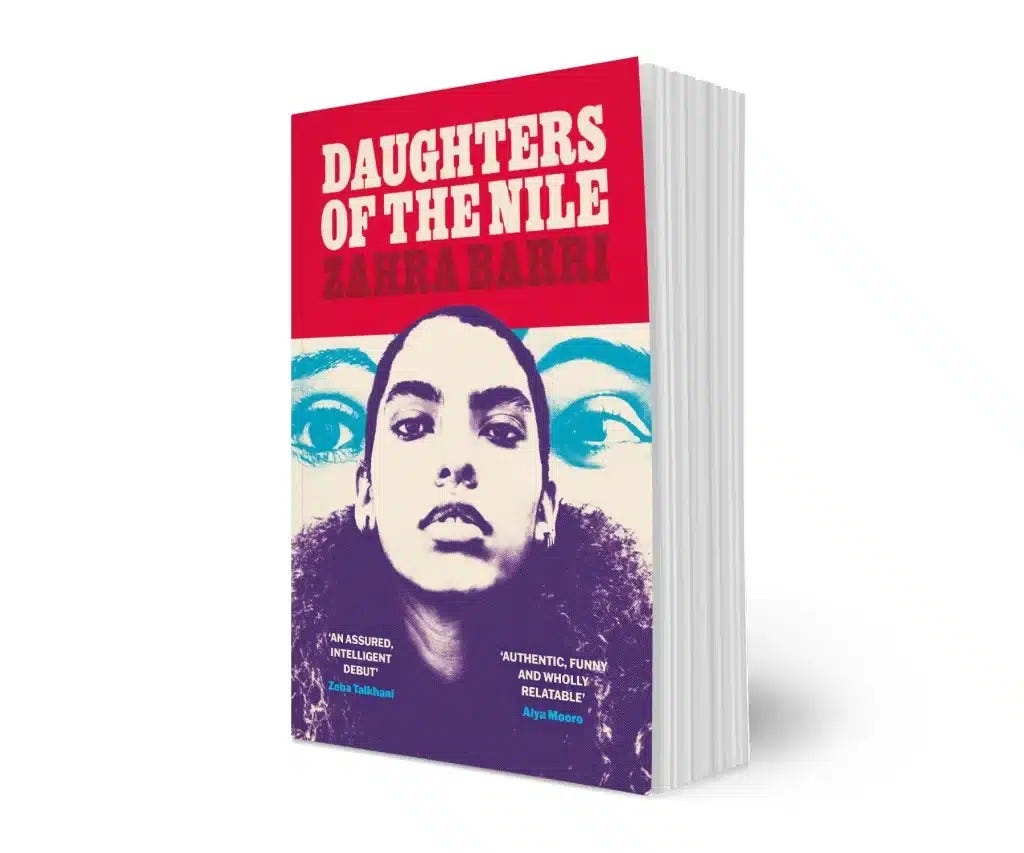A daughter of the Nile
Author Zahra Barri on her debut book, and the books she read to write it
A massive congrats to Zahra Barri for the release of her debut book Daughters of the Nile, which was released last week. I was lucky enough to get a proof copy of the book and I flewwwww through it. It is hands down one of the best books I’ve read in recent months or even years, in fact, and it was an honour to have been asked to blurb the book, and to get the opportunity to chat to Zahra about it.
Following the lives of three three generations of women from the Bin-Khalid family, starting in Cairo in the 1940s and spanning Saudi Arabia, Iran and almost present-day London, the novel touches on themes of feminism, female friendship, shame, identity, and beyond in a powerful reclamation.
Getting to speak with Zahra, the brilliant woman behind this book that I resonated with so much was truly an honour, and, as I expected, we connected quickly. Especially when it came to our experiences of womanhood, being third-culture kids, as well as our fears / feelings about our books coming out into the world, and the ways in which writing them has changed us. I cannot recommend her book more. Please order it here if you haven’t already.
Below are the openings of my profile on Zahra for Harpers Bazaar Arabia, where she tells me about why and how her book is a love letter to Egypt, how writing it has changed her, and more.
Paid subscribers also get great thoughts from Zahra that didn’t make it into the piece, as well as some book picks from her; what she read in the process of researching for and writing her novel. I’ve added many of them to my own reading list!
“I feel like I have to send my family an email to say, like, ‘Look, please don’t be upset,’” the Irish-Egyptian stand-up comedian-turned author Zahra Barri jokes when I ask how she’s feeling about the release of her debut novel, Daughters of the Nile. “It’s just so based on them, but then completely fabricated at the same time,” she expands. “And also, it’s quite a racy novel, and my dad is going to read it, so it’s strange.”
Like many third-culture kids, Zahra has long felt like she’s not quite British or Egyptian enough, perpetually code-switching, or letting down either one or other of her cultures, but there’s nothing more Arab than starting a conversation about your first published book by talking about what your family are going to think of it.
As with many immigrants, when her Egyptian father moved to the UK in the 1970s, his focus was on integration, something he imagined would be easier for his children if they didn’t speak Arabic. But identity is something that proved complicated anyway, Zahra says. “I feel like this book is almost like a compensation. It’s a real love letter to Egypt.”
And a love letter it is indeed. Following the lives of three generations of women from the Bin-Khalid family, starting in Cairo in the 1940s and spanning Saudi Arabia, Iran and almost present-day London, the novel touches on themes of feminism, female friendship, shame, identity, and beyond, in a powerfully nuanced reclamation of a history most of us have never seen or even imagined, other than perhaps in the wistful recollections of our grandparents.
After spending 11 years on stage developing her voice as a stand-up comedian, crafting relatable, funny ways to talk about such themes, Zahra began a PhD in creative writing, where she stumbled across the autobiography of Egyptian feminist Doria Shafik (founder of the 1940s magazine Bint Al-Nil, aka Daughters of the Nile, and one of the leaders of the women’s liberation movement, who worked to get Egyptian women the vote). All the pieces of the story came together, then…
Read the profile on Harpers Bazaar Arabia here & order Zahra’s novel Daughters of the Nile here.
For paid subscribers, keep reading for some great thoughts from Zahra that didn’t make it into the piece, as well as some of the books she read in the process of researching for and writing her own novel.
On collective amnesia of and as Arabs:
Keep reading with a 7-day free trial
Subscribe to The Greater Conversation to keep reading this post and get 7 days of free access to the full post archives.





